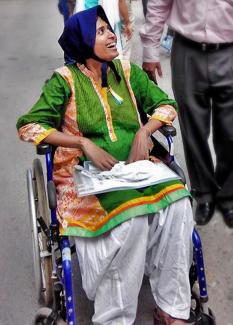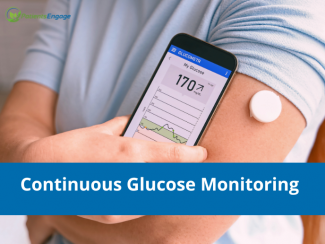
Imagine participating in a meeting while lying in bed. This is reality for 35-year-old Smitha Sadasivan, who has Multiple Sclerosis, an autoimmune condition. Her reality has been exhaustion, physical pain, vision problems and many other issues. But this M.Phil holder, who works for an NGO and is a disability rights activist, refuses to give up. Her story.
You were diagnosed with Mutiple Sclerosis (MS) in 1999. What is your present condition – has the disease progressed? Are there some things you are unable to do?
Yes, the condition has progressed further.
Over the years, I have been dealing with various factors. Apart from the exhaustion and pain, I also have urinary incontinence, reduced mobility, numbness, reduced sensation on the body, gastrointestinal issues due to the medication, and many other factors.
I got into serious visual issues and multiple lesions are evident in recent MRI scanning on my brain. I have also been found positive for neuromyelitis optica (NMO) antibodies. (Ed’s note: This is a condition that affects the optic nerve and spinal cord.)
I got a positive at Shankar Netralaya (antibodies to aquaporin 4) whereas ELISA test (to detect immune response) at my neurologist’s clinic showed a negative. So my doctor considers it to be primarily MS and secondarily SLE (Systemic Lupus erythematosus).
Since 1999, it was evident that my entire central nervous system was affected, manifesting different symptoms affecting different organs/functions). So the doctor has changed the medicine, stopped Avonex injection (as I got a relapse) and started immunosuppressants - Rituximab - two doses a year. I have taken the 1st dose and further deterioration has stopped. The Doc said that vision will improve with the 2nd dose, which is on 16th of August. Currently I have difficulty in reading, recognising faces even from a short distance, seeing bright light like TV, computer, daylight etc.
Did anyone in your family suffer from any autoimmune disorders?
None of my family members had autoimmune disorders.
You had mentioned that acupuncture had helped you. Can you tell us about that?
Initially I felt better immediately after treatment but the effect did not stay for more than a couple of hours, like ease in body heaviness, movement, energy level etc, but slowly with repeated treatments, these factors improved and stayed for longer periods. However the treatment had to be repeated at short intervals.
What other alternate therapies did you try?
I tried Ayurveda, but it didn’t work as I was unable to continue it for a considerable duration due to weakness of body to withstand the initial reactions. I tried homeopathy for eight months, but it didn’t work. I tried Siddha (traditional medicine) for 2 years but saw no improvement. Hypnotherapy did give me some relief from neck pain and ease of body. I attended eight sessions. I want to go for more. Meditation was a good experience. I felt peace, joy and energy. I also tried energy healings like pranic healing and rekhi by which I felt energetic for a few days but could not continue to practice them for different reasons. I’ve been following traditional medicines such as ginger, turmeric, pepper and other herbs as food/drinks which are effective in due course. They helped in controlling cold and dust allergy, which I used to get every other day, a few months back.
What changes have you had to make to your diet?
I eat protein-rich food, sprouts, fruits, dates and almonds. I avoid junk food and oily food. I don't follow any restriction in food during travels and meeting.
What medications are you on currently? What are the side effects?
I take immunosuppressants, steroids, calcium, vitamins and pantaprazole tablets.
Immunosuppressants control the immune system, so it makes you susceptible to infections. Steroid weakens the bone, affects the digestive system and has other side effects as well. Extra calcium affects the kidney. Continuously taking medicines affects the liver.
As a disability rights activist, what are the top three things you would like to see changed in India?
- I would like to see the whole country become accessible with respect to built environment & infrastructure, transport systems, information systems including accessible websites, braille, AAC & sign language communication. (Ed’s note: AAC refers to boards & devices with pictures and symbols that help people communicate.)
- Full legal capacity for persons with disabilities as provided by UNCRPD (United Nations Convention on the Rights of Persons with Disabilities) to be enacted in our legislation and implemented along with adequate support system on monitoring.
- Personal Assistant programme to be introduced and implemented for persons with high support needs.
Related Reading: Have Wheelchair, Will Travel
What would you say to someone who has just been diagnosed with MS?
Be hopeful, there is much research being done and new medicines are evolving in the medical field as well as other support systems / groups. Be bold and aspiring. Try to keep yourself engaged in a positive way. Go for further education and appropriate employment. Always stand up for your rights. Relax, have leisure outings and take time for yourself. Take responsibility in your family and society in whatever way possible.
What can family members do to help a loved one with MS? What do they have to be prepared for?
Family members need to provide space to persons with MS and respect their space, involve them in decision making, etc. Family members need to take care of themselves and their physical and mental health too. They should keep encouraging the family member, regardless of the duration for which he/she has been coping with MS. And do not ignore their complaints however many times they may repeat it.
What is the most challenging aspect of this condition and how did you deal with it?
1. The most challenging task according to me is to keep my energies up during full day meetings / conferences. I get exhausted very soon and have difficulty even to listen continuously. I ask the oganisers to arrange for a bed wherever I go, so that I can lie down and rest. I prefer the bed to be in meeting halls, so that I need not miss any information from discussions/meetings while I rest. I also don’t get to network with colleagues / experts, etc. as I will rest during breaks when everyone interacts and networks.
In many instances, I have avoided meetings or long distance travel due to my fatigue, inaccessible climate or sudden infection.
2. The second difficulty is to control urine/motion. I get into bladder/bowel accidents very often. It is very difficult with diapers. I am mostly forced to use unhygenic and inaccessible toilets, where I have picked up infections. Inaccessible toilets are dangerous as you could fall down.
Anything else you would like to add?
Yes, words cannot express my gratitude to my friends, professors and well wishers who have been supporting me in all walks of my life and motivating me to move on.
My parents have taken my disorder and my disability in good spirit. My mother encourages me with positive words all the time and is a real friend in spite of all the chaos and difficulties that she has to undergo especially during my relapses when she has to fully manage me physically all by herself.
MSSI (Multiple Sclerosis Society of India) Chennai has been a great support since 2002. They provide physiotherapy, counselling, leisure activities, information dissemination, doctors meet, social worker home visits, care givers care, etc. MSSI, and specially Mrs. Ann Gonsalvez, have been great emotional support to all members.
Vidya Sagar has provided me a platform to be myself and work my way.
Last but not the least, sincere thanks are ever due to my ever-loving master Sri Sri Ravi Shankar, whose guidance and love sustained me with a smile through all odds.






